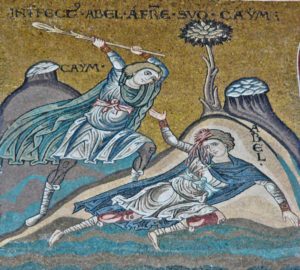14 February OS 2018: Tuesday of the Second Week of Lent; S. Auxentios of Mt. Auxentios
The first reading at Vespers today is Genesis 4:8-15.
Cain murdered his brother out of envy.
The Lord accepted Abel’s sacrifice, and He did not accept Cain’s sacrifice. Therefore enraged at this affront to his ego and hating his brother for being good, while he was evil, Cain slew him in secret. Thus always with evil men: They hate the good simply for being good. The more good the good men show them, the more enraged they become, until finally nothing will satisfy them but the death of the good. Even then their bottomless egotism will never be appeased, for the nature of unrepented rebellion against God dictates that the rebels will grow ever hungrier for appeasement to their egos for all eternity, and the more lives they destroy, the more souls they consume, the hungrier they grow. Satan is the hungriest, angriest, and least satisfied person in all reality, and his hunger, anger, and dissatisfaction will know no end forever.
Men are not Satan or demons. The Lord says in Matthew 25 that hell was made not for men but for devils, while the Father has prepared His Kingdom for man. But men choose to be like devils, by refusing to accept God as God: God’s sovereignty, God’s holy will, God’s law. They repeat the sin of Cain, the sin of all renegades, anarchists, and murderers: they choose to be their own god. Even then, unlike the demons, they can repent before death: Adam, after refusing once to repent, later repented after he lost Paradise, and he was saved, becoming the first man the Lord Jesus took by the hand and raised from hell. Or they can stew in resentment like Cain and die in their pride. They can boastfully engrave, “I did it my way,” on their tombstones and then go to burn in hell. Congratulations to them: they got what they really wanted. In the end, so do we all.
The Lord Jesus Christ, slain for our sake by envious men, shows us the path of humility and obedience. With His loving voice, He calls to us today, as He called to Adam and Eve in the Garden, as He called to Cain: “Where art thou? Where is thy brother?” Great Lent is an image of our whole earthly life, for each is a short span of time given to answer His call. The time is short, and it will end. What shall we do with this time? What shall we do, today, to heed His loving voice in action and not merely wishful thinking?
O loving Lord, innocent Lamb slain for our sins, glory be to Thee!

